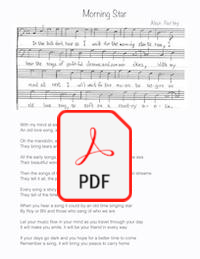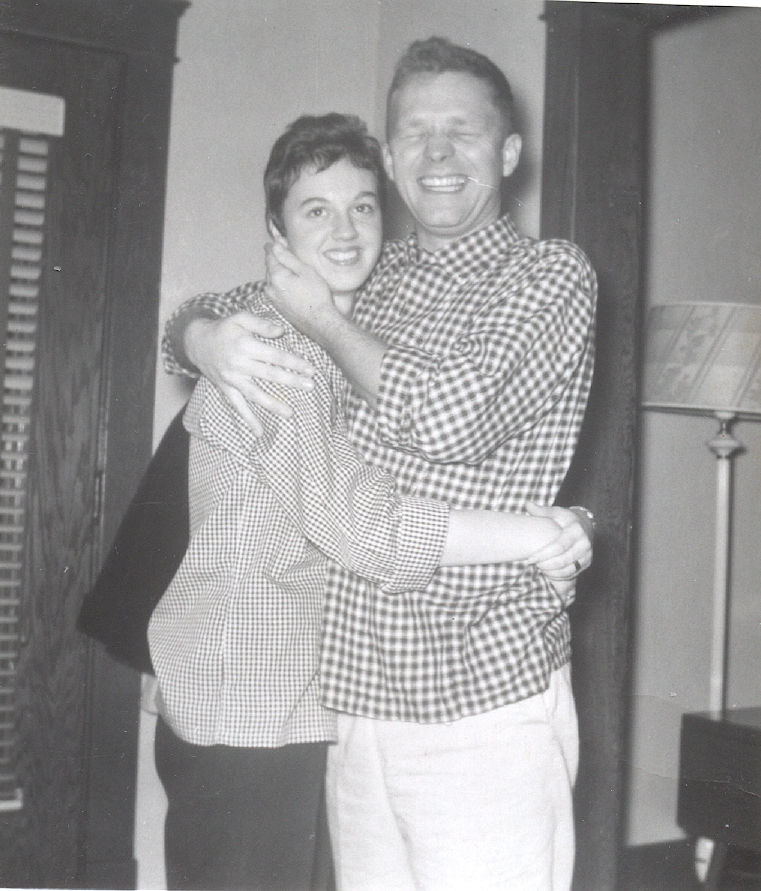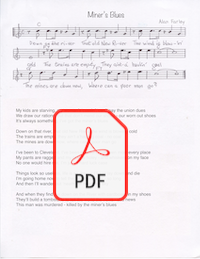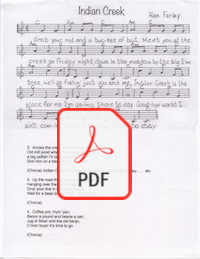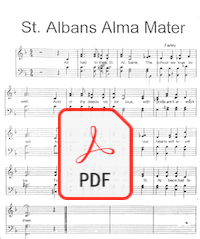This song just kind of wrote itself in 1961, originally as just a guitar piece called “Lonely Tune”. I then put wrote some lyrics in 2019 and renamed it “Morning Star.”
Category: My Songs
Bina (1961)
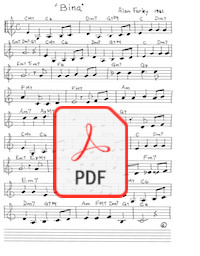
I wrote this little romance song for Carol, and used the piano in the music department, since we didn’t have one at home. “Bina” is how Carol pronounced her middle name “Lavinia” (La-veen-ya) as a child, and “Carol Bina” was a well-known nickname.
Unfortunately, there is no recording of this song.
Miner’s Blues (1961)
Indian Creek (1958)
I spent a lot of time camping at Indian Creek, and wrote this in 1958. It took 2-3 evenings to write it, and I sang it as a lullaby to Patrick as a baby.
This video features Alan singing this song from a recording made in 1965. The photos were all taken by Alan’s brother David in the 1950s and 1960s.
St. Alban’s High School Alma Mater (1955)
I had just arrived as band director at SAHS in august 1955. I was full of energy, anxious to lead a band that would play fine music. At the time, I was living at home (age 24, in South Charleston). After a few weeks of working in my new job, it occurred to me that a school with as rich a history as St. Albans should have a “school song”. I became highly motivated to make that happen, wrote this in one afternoon, after football season). It’s still the official alma mater all these years later.
Having finished the melody and lyrics, the next job was to write choral parts, which I did.
I introduced the “new” Alma Mater late that fall, but it didn’t get performed until the following year, when I assumed the director ship of the choral music program.
I taught at St. Albans from 1955 until 1963, a time I will never forget.
That same year — 1955-56 — I was on a roll, and began writing lyrics to fight songs. I wrote the words “Go Red Dragons, go all the way” which I understand is still being sung at SAHS athletic events.
In January 1956, the school principal (Basil Liggett (an excellent school leader whom I admired greatly), advised me that the band had bene invited to attend the annual Cherry Blossom Festival in April in Washington, D.C.
I was flabbergasted. The band was barely scraping by, virtually without funds. Such an event would be costly, and it was left to me to find a way to pay for the trip.
along with a few donations and fudn raiser, I decided we would produc a music show with Proceeds targeted for the costs of the Washington trip. And we did. And we named the show “OPUS 56”. That was the first Opus, and the trip to Washington became a reality.
It only followed that the success of Opus 56 would lead to “OPUS 57” and so on until I left St. Ablans for a teaching position in Virginia in 1963. I’ll not soon forget the richly rewarding years I taught music at SAHS; it remains a treat to meet socially with former students and friends from those times.
If anyone knows of an online recording of the Alma Mater (the more official the better), please send us the link via our Contact form. Thank you!
The Lord’s Prayer (1954)
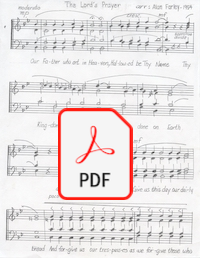
This arrangement of The Lord’s Prayer was composed in 1954 for performance as part of the Orthodox Liturgy/Service at St. George Orthodox Church in Charleston, WV. The regular Sunday service, which was performed by the priest and cantors, was interspersed with musical responses and liturgy by the choir. The Lord’s Prayer, performed at every service, was sung by the choir, with the final lines being sung/chanted by the priest. (Note: it is my understanding that the final words “For Thou art the Kingdom, the Power, and the Glory Forever and Ever” are not included in the Roman Catholic or Orthodox congregations’ recitations of The Lord’s Prayer, but rather are stated by the attending priest.)
The music being performed at that time — and in that Church — was from the Russian, sung in English. Accordingly, I attempted to give this arrangement a reasonable Russian flavor in keeping with the rest of the “Sunday music.” Notably, the church membership was primarily Syrian/Lebanese, as Charleston had a sizable Lebanese community. The priest at that time, Father Raphael Husson, was Lebanese. Nevertheless, the Russian music was in place when I arrived as choir director, and it was/is indeed quite beautiful.
As an integral part of the service, the Lord’s Prayer was performed in straightforward manner, without repetitions of words or music. Indeed, this version may be inappropriate as a regular Protestant-type anthem (partly due to its brevity), but could perhaps be performed to serve some other special occasion.
My Songs – Introduction
With a couple of exceptions, the songs included here are all about the woods and waters. Mostly about camping and fishing on New River and Indian Creek with the “gang,” Hanry Hale (called Big Henry in one song), his sons and grandsons, along with a few close buddies.
The songs were ‘written’ by me, with no intent whatever to perform them in public, or to record them for general distribution. Rather, the songs were for the riverbank, and were mostly written with a particular place and event in mind. I would take a “new” song into camp just to entertain us campers, nothing more.
It follows that I didn’t sing the songs for friends, neighbors or others. Not that I guarded their privacy — that’s just the way it was. I sang them now and then at home, and I played guitar likewise: now and then. I never played guitar with another guitar player, never even knew another guitar player, so you’ll understand that my technique was alive with wrong fingering, bad habits and no finesse. I never used a pick. Never owned a capo until I was about fifty. You would agree with all this if you were to watch me play.
So, the songs are what they are — injected with memories of individual camps, thrown together in time for the upcoming roundup.
I’ve long known that when it comes to my music I have a dual personality.
There’s the formal, classical side, in and with which I remain totally engrossed as a listener and “student.” (I haven’t played oboe or sax in many years, and my “formal” singing voice is long gone, replaced rudely by COPD.)
Then there’s the country side, with the southern mountain core — with a southern mountain family, it comes naturally. Growing up in town among country folk made good sense to me.
So the country songs are a matchup with the times in the woods and on the waters, embellished by the ever-present train whistle. Have a listen.

